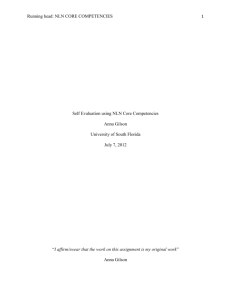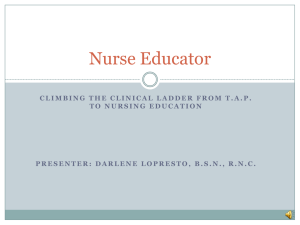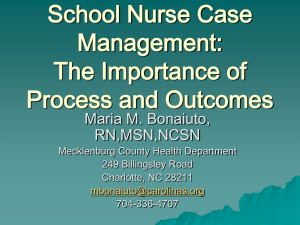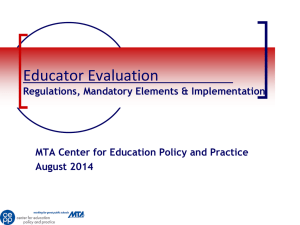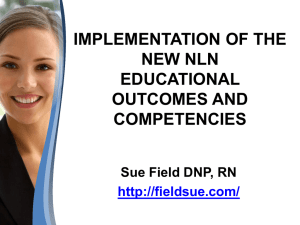Competencies of Nurse Educators in Curriculum Design: A Delphi
advertisement
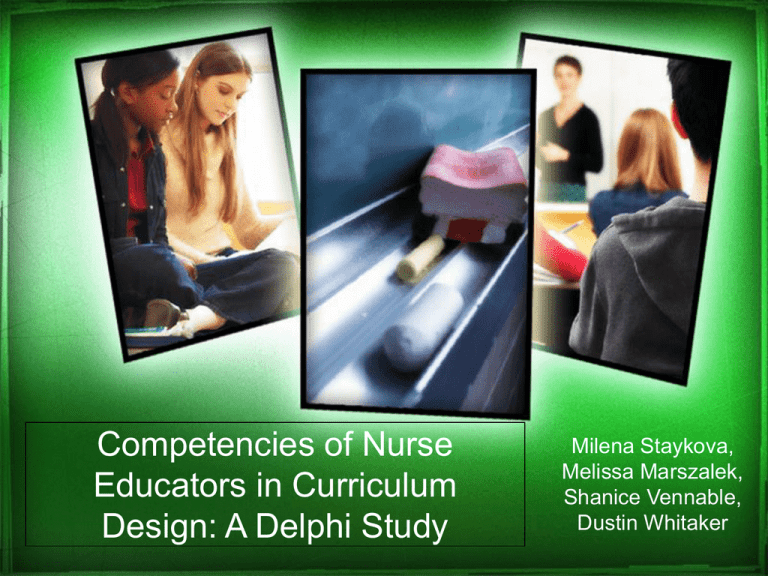
Competencies of Nurse Educators in Curriculum Design: A Delphi Study Milena Staykova, Melissa Marszalek, Shanice Vennable, Dustin Whitaker Objectives Upon completion the participants in this session will be able to: • Validate the need of competencies for nursing educators in charge of curriculum design. • Describe the steps in a Delphi Study. • Evaluate the outcomes of a research study on competencies of nursing educators in curriculum design • Network with colleagues Literature Review “The appropriate educational preparation for a nurse educator has been debated for many years” (SREB, 2002, p. 2) “The nurse educator competencies are important because the ability — or lack of ability — can affect the accomplishments of the faculty and students (Krisman-Scott, 1998, p. 318). “Nurse educators who practice in academic settings also must have knowledge and skill in curriculum development, assessment of program outcomes, and being an effective member of an academic community, among other things. (NLN, 2002, para. 11) Definitions Competence is “the application of knowledge and interpersonal decision making, and psychomotor skills in the performance of a task or implementation of a role” (NLN, 2007, para. 30). In curriculum design, the concept of competence defines the tasks of developing curricula. Competency is “a principle of professional practice that identifies the expectations required for the safe and effective performance of a task or implementation of a role” (NLN, 2007, para. 31). In curriculum design, the concept of competency describes the practice and expectations of developing effective curricula. IOM/QSEN Patientcentered care Interdisciplin ary teams Evidencebased practice Quality improvement Informatics Essentials of BSN Liberal Education Quality Care and Patient Safety Scholarship for Evidence Based Practice Information Management and Application of Patient Care Technology Healthcare Policy, Finance, and Regulatory Environments Interprofessional Communication and Collaboration Clinical Prevention and Population Health Professionalism and Professional Values Baccalaureate Generalist Nursing Practice NLN Facilitate Learning Facilitate Learner Development and Socialization Use Assessment and Evaluation Strategies Participate in Curriculum Design and Evaluation of Program Outcomes Function as a Change Agent and Leader Quality Improvement in the Nurse Educator Role Engage in Scholarship Function within the Educational Environment SREB Educator Collaborator Scholar Comparison and Contrast IOM/QSEN Essentials of BSN SREB NLN Patient Centered Care Quality Care and Patient Safety Clinical Prevention and Population Health Educator Facilitate Learner Development and Socialization Quality Improvement in the Nurse Educator Role Interdisciplinary teams Interprofessional Communication Collaborator Participate in Curriculum Design and Evaluation of Program Outcomes EBP Scholarship for Evidence Based Practice Scholar Facilitate Learning Use Assessment and Evaluation Strategies Engage in Scholarship Quality improvement Quality Care and Patient Safety Scholar Quality Improvement in the Nurse Educator Role Engage in Scholarship Informatics Information Management and Application of Patient Care Technology Facilitate Learning Mixed Method: The Delphi Process Round 3 n=27 Round 2 n=26 Round 1 n=37 1. Send Questionnaire with filtered questions based on %, μ, SD 2. Follow up calls 2. Collect & Analyze data 3. Based on the research question continue until agreement/consensus or conclude if set of competencies were identified based on majority rule or set % 1. Send Same Questionnaire with added data from Round 1, ex. %, μ, SD 2. Follow up calls 3. Collect & Analyze Data 1. Identify Candidates 2. Send Invitation 3. Develop & Send Questionnaire with scales and comment boxes 4. Follow up calls 5.Collect & Analyze Data Discussions Skill Set Mind Set Educational Background Curriculum Competencies: Assessing Designing Planning Implementation Evaluation Educator Professional Competencies Collaborator Personal Competencies Effective Partnership Building Relationships Scholar Promoting Scholarship . Disseminating Knowledge Conclusions: Nurse Educator Competencies’ Development Advanced Education Certification in Curriculum Design Basic Education Workshops to assess personal needs for ongoing professional development Practice Assessing, Design, Planning, and Evaluating Curriculum Develop effective partnership and building relationships by consulting, communicating, and working with other faculty members within and outside the discipline Master of Science in Nursing Nurse Educator Certification Scholarship and dissemination of knowledge Put the Things Together Questions • For any additional information please contact Dr. Staykova at mpstaykova@jchs.edu Acknowledgments Thank you to the nurse educators who participated in the study. The authors would like to thank Dr. Dr. Eula Aiken from SREB Council on College Education for Nursing, for the permission to use model and instrument. A word of gratitude to Dr. Bronsard, Dr. Molinari, Dr. Johnson, and Dr. Tousman, colleagues from JCHS, and friends for their feedback on the study. Finally, the authors would like to acknowledge the generous support of JCHS, Faculty and Professional Staff Development, for funding a grant for the study.
